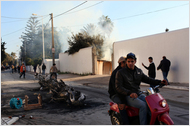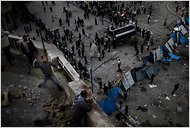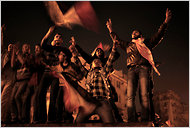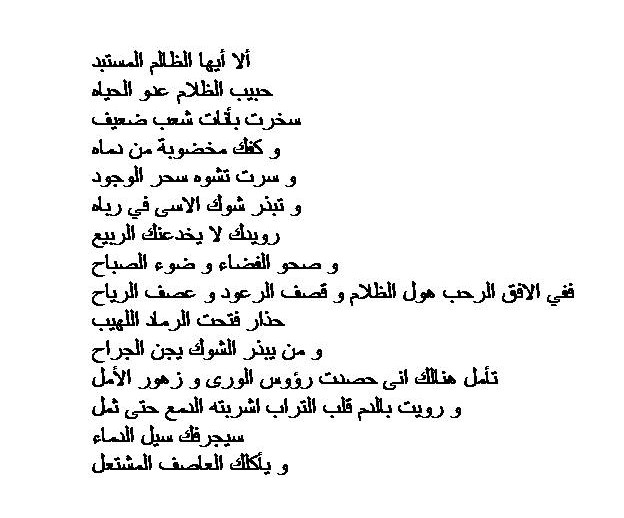Uwezo Tunao
JF-Expert Member
- Nov 14, 2010
- 6,942
- 1,190
Egypt's army dissolves parliament
Military rulers say they will remain in charge for six months until elections
are held as some protesters vow to remain.
Last Modified: 13 Feb 2011 18:37 GMT

policeman+looks+towards+the+wreckage+of+burnt+motor+bikes+near+the+site+of+a+bomb+blast,+which+took+place+during+a+Shiite+Muslim+procession+a+day+earlier,+in+Lahore+September+2,+2010.jpg
A policeman looks towards the wreckage of burnt motor bikes near the site of ...
islamizationwatch.blogspot.com

egypt‑anti.jpg
Egypt,(GGS NEWS) 29 Jan 2011 : Anti-government protesters have taken to the ...
ggsnews.com
Egypt's military has dissolved parliament and suspended the constitution, two days after Hosni Mubarak, the long-serving president, stepped down in the wake of a popular uprising.
The country's Supreme Council of Armed Forces announced on Sunday that it would remain in charge of the country for six months until a new government is formed.
The military council announced the move in a statement on state television, adding that it would form a panel to amend the constitution before submitting the changes to a popular referendum.
The announcement came shortly after Egypt's prime minister announced that the cabinet appointed by Mubarak shortly before he stepped down, would stay in place.
Ahmed Shafiq, speaking after his first cabinet meeting since Mubarak left on Friday, said Egypt's caretaker government will remain for the country's transition towards democracy.
He said that security would remain a priority and pledged to fight corruption and restore peace in the country, following 18 days of pro-democracy protests.
"The first priority for this government is to restore security and to facilitate daily life for its citizens," he said. "I guarantee that this [cabinet] will return rights to the people and fight corruption."
Military in charge
Al Jazeera's James Bays, reporting from Cairo, said the two announcements do not indicate that the prime minister and military council are talking against each other.
But it is "quite clear that the power now rests entirely" with the military council, he said. "They've taken on the role of the presidency and the prime minister and the other ministers carry out their orders.
"The key point is the military is saying they are only in power for a temporary basis, for six months or they'll go earlier if elections are called before six months.
But our correspondent noted that "one thing that wasn't in that communique that protesters have asked for, was the repeal of emergency laws".
Protest organisers had called for both the dissolution of parliament and the lifting of a 30-year-old state of emergency. Some protesters have vowed to remain in Cairo's Tahrir Square - the epicentre of the uprising - until all of their demands are met
Scuffles broke out early on Sunday as soldiers tried to remove activists from the square.
Soldiers shoved pro-democracy protesters aside to force a path for traffic to start flowing through Tahrir Square for the first time in more than two weeks.
Our correspondent in Cairo said the confrontations between troops and protesters was something of a "flashpoint".
"I think it reflects a bigger problem, that the military believes that now Mubarak is out, it's time for stability," he said.
"But some of the protesters think not enough has been done yet. They don't want to clear that square until the army has handed over to a civilian government."
Police protest
At one point a group of several dozen police officers marched into the square bearing flowers, proclaiming their solidarity with the uprising and chanting: "The police and the people! With one hand!"
But they were soon chased away by protesters, who accuse the police of decades of arbitrary arrests, torture and extortion, as well as a heavy-handed attempt to crush the revolt that left hundreds dead.
Elsewhere, even as the demonstrations against Mubarak wound down, new challenges emerged as workers went on strike.
In the latest such moves, employees at two public sector banks in Cairo went on strike demanding better pay. In addition, about 2,000 policemen demonstrated in front of the Interior Ministry, complaining about the gap in salaries between officers and enlisted.
Egypt's state news agency said that in light of the strikes, the Central Bank decided it will suspend work in banks on Monday. Banks will reopen on Wednesday, because Tuesday is also a public holiday.
Meanwhile, normality began to return to other parts of Egypt. The tents, where protesters camped out during the 18 days of protests, were removed from Tahrir Square.
In the northern city of Alexandria, Al Jazeera's Jamal ElShayyal said people had also begun to get back to work, adding that Sunday's military announcement was likely to reassure activists in the city.
"Alexandria didn't have the same amount of sit-in protesters that we've seen in Tahrir. However those that have said they will continue their demonstrations have been assured a lot more by this time frame given by the military."
But Ashraf Ahmed, a protester in Cairo, vowed that he was not going to leave "because so much still needs to be done. They haven't implemented anything yet".
Protest organisers have threatened more rallies if the governing military council fails to accept their agenda for reform. "If the army does not fulfil our demands, our uprising and its measures will return stronger," Safwat Hegazi, a protest leader, said.
UJUMBE HUMU:
Maisha Misri bila Dikteta Hosni Mubarak yawezekana na safari ndio imeanza kwa kuzingatia maslahi na matakwa ya wananchi mbeeele kwa kila kitu.
Siku chache baada ya 'Nguvu ya Umma' kujitwalia madaraka kwa kutumia silaha hatari za UMOJA, DHAMIRA YA DHATI NA IMANI KWAMBA 'UWEZO WANAO', sasa uongozi wa nchi hiyo chini ya serikali ya muda ya kijeshi waamua kujivua rasmi gamba la mwisho la joka Nyamwiru Hosni Mubarak kwa kutimulia mbali bunge lake lililochaguliwa hivi majuzi tu kwenye uchaguzi uliodaiwa kuchakachuliwa kila idara na chama tawala NDP.
Hii hali inaashiri lugha ya ishara kana kwamba Wa-Misri wameamu kumkataa shetani pamoja na mbuyu wake wote wakikemewa kwa sala nzito waelekee baharini hukohuko alikoelekea FISADI mwenzao.
Kwa gharama ya damu ya watu zaidi ya Mashujaa 300 'Nguvu ya Umma' nchi hiyo imeweza kujinunulia mwanzo mpya na matumaini kwa watoto wao na vizazi vijavyo kuendelea kufurahia wanatakavyojichagulia tu wenyewe.
Vita mbeele wananchi wa Misri mpaka haki sawa kwa wote ije ipatikane
Military rulers say they will remain in charge for six months until elections
are held as some protesters vow to remain.
Last Modified: 13 Feb 2011 18:37 GMT
policeman+looks+towards+the+wreckage+of+burnt+motor+bikes+near+the+site+of+a+bomb+blast,+which+took+place+during+a+Shiite+Muslim+procession+a+day+earlier,+in+Lahore+September+2,+2010.jpg
A policeman looks towards the wreckage of burnt motor bikes near the site of ...
islamizationwatch.blogspot.com
egypt‑anti.jpg
Egypt,(GGS NEWS) 29 Jan 2011 : Anti-government protesters have taken to the ...
ggsnews.com
Egypt's military has dissolved parliament and suspended the constitution, two days after Hosni Mubarak, the long-serving president, stepped down in the wake of a popular uprising.
The country's Supreme Council of Armed Forces announced on Sunday that it would remain in charge of the country for six months until a new government is formed.
The military council announced the move in a statement on state television, adding that it would form a panel to amend the constitution before submitting the changes to a popular referendum.
The announcement came shortly after Egypt's prime minister announced that the cabinet appointed by Mubarak shortly before he stepped down, would stay in place.
Ahmed Shafiq, speaking after his first cabinet meeting since Mubarak left on Friday, said Egypt's caretaker government will remain for the country's transition towards democracy.
He said that security would remain a priority and pledged to fight corruption and restore peace in the country, following 18 days of pro-democracy protests.
"The first priority for this government is to restore security and to facilitate daily life for its citizens," he said. "I guarantee that this [cabinet] will return rights to the people and fight corruption."
Military in charge
Al Jazeera's James Bays, reporting from Cairo, said the two announcements do not indicate that the prime minister and military council are talking against each other.
But it is "quite clear that the power now rests entirely" with the military council, he said. "They've taken on the role of the presidency and the prime minister and the other ministers carry out their orders.
"The key point is the military is saying they are only in power for a temporary basis, for six months or they'll go earlier if elections are called before six months.
But our correspondent noted that "one thing that wasn't in that communique that protesters have asked for, was the repeal of emergency laws".
Protest organisers had called for both the dissolution of parliament and the lifting of a 30-year-old state of emergency. Some protesters have vowed to remain in Cairo's Tahrir Square - the epicentre of the uprising - until all of their demands are met
Scuffles broke out early on Sunday as soldiers tried to remove activists from the square.
Soldiers shoved pro-democracy protesters aside to force a path for traffic to start flowing through Tahrir Square for the first time in more than two weeks.
Our correspondent in Cairo said the confrontations between troops and protesters was something of a "flashpoint".
"I think it reflects a bigger problem, that the military believes that now Mubarak is out, it's time for stability," he said.
"But some of the protesters think not enough has been done yet. They don't want to clear that square until the army has handed over to a civilian government."
Police protest
At one point a group of several dozen police officers marched into the square bearing flowers, proclaiming their solidarity with the uprising and chanting: "The police and the people! With one hand!"
But they were soon chased away by protesters, who accuse the police of decades of arbitrary arrests, torture and extortion, as well as a heavy-handed attempt to crush the revolt that left hundreds dead.
Elsewhere, even as the demonstrations against Mubarak wound down, new challenges emerged as workers went on strike.
In the latest such moves, employees at two public sector banks in Cairo went on strike demanding better pay. In addition, about 2,000 policemen demonstrated in front of the Interior Ministry, complaining about the gap in salaries between officers and enlisted.
Egypt's state news agency said that in light of the strikes, the Central Bank decided it will suspend work in banks on Monday. Banks will reopen on Wednesday, because Tuesday is also a public holiday.
Meanwhile, normality began to return to other parts of Egypt. The tents, where protesters camped out during the 18 days of protests, were removed from Tahrir Square.
In the northern city of Alexandria, Al Jazeera's Jamal ElShayyal said people had also begun to get back to work, adding that Sunday's military announcement was likely to reassure activists in the city.
"Alexandria didn't have the same amount of sit-in protesters that we've seen in Tahrir. However those that have said they will continue their demonstrations have been assured a lot more by this time frame given by the military."
But Ashraf Ahmed, a protester in Cairo, vowed that he was not going to leave "because so much still needs to be done. They haven't implemented anything yet".
Protest organisers have threatened more rallies if the governing military council fails to accept their agenda for reform. "If the army does not fulfil our demands, our uprising and its measures will return stronger," Safwat Hegazi, a protest leader, said.
UJUMBE HUMU:
Maisha Misri bila Dikteta Hosni Mubarak yawezekana na safari ndio imeanza kwa kuzingatia maslahi na matakwa ya wananchi mbeeele kwa kila kitu.
Siku chache baada ya 'Nguvu ya Umma' kujitwalia madaraka kwa kutumia silaha hatari za UMOJA, DHAMIRA YA DHATI NA IMANI KWAMBA 'UWEZO WANAO', sasa uongozi wa nchi hiyo chini ya serikali ya muda ya kijeshi waamua kujivua rasmi gamba la mwisho la joka Nyamwiru Hosni Mubarak kwa kutimulia mbali bunge lake lililochaguliwa hivi majuzi tu kwenye uchaguzi uliodaiwa kuchakachuliwa kila idara na chama tawala NDP.
Hii hali inaashiri lugha ya ishara kana kwamba Wa-Misri wameamu kumkataa shetani pamoja na mbuyu wake wote wakikemewa kwa sala nzito waelekee baharini hukohuko alikoelekea FISADI mwenzao.
Kwa gharama ya damu ya watu zaidi ya Mashujaa 300 'Nguvu ya Umma' nchi hiyo imeweza kujinunulia mwanzo mpya na matumaini kwa watoto wao na vizazi vijavyo kuendelea kufurahia wanatakavyojichagulia tu wenyewe.
Vita mbeele wananchi wa Misri mpaka haki sawa kwa wote ije ipatikane







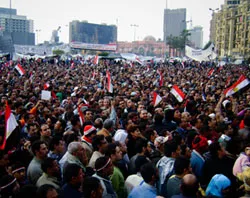


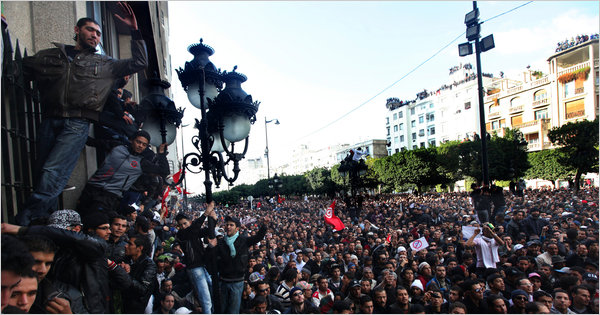

 Interactive Feature
Interactive Feature  Interactive Feature
Interactive Feature  Interactive Feature
Interactive Feature 